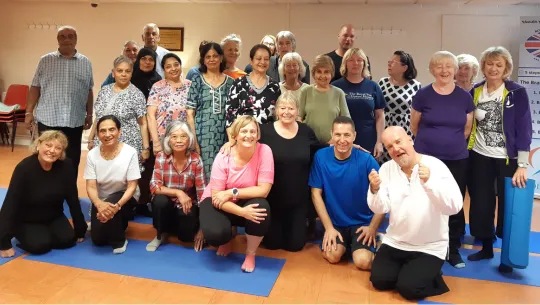
Qi Gong vs Tai Chi in New Malden: A Simple Guide for Beginners
Both Qi Gong and Tai Chi are calm, low-impact ways to move, breathe and feel better. They share roots in traditional East Asian practice and they both help balance, mobility and mood. The difference is in how they’re taught and how quickly beginners feel confident.
If you want an easy, friendly starting point in New Malden, try our Monday Qi Gong class, 12–1 pm (£10) at the Graham Spicer Institute.
We meet Mondays 12–1 pm (£10) at the Graham Spicer Institute, KT3 4HL. Beginners and seniors welcome. Reserve your place: https://brightbeingsacademy.com/new-malden-qi-gong-mondays
Do you want to see the full New Malden guide series? See the hub: https://brightbeingsacademy.com/new-malden-classes-gentle-exercise-hub
What Qi Gong and Tai Chi have in common
• Gentle, joint-friendly movement you can scale to your body.
• Balance training through slow weight shifts.
• Breath-led calm that settles the nervous system.
• Mindful attention that lifts mood and focus.
The key differences (made simple)
Learning curve
• Tai Chi: sequences (“forms”) with many steps. Beautiful, but takes time.
• Qi Gong: short, repeatable flows. Easy to follow on day one.
Structure
• Tai Chi: choreography that you memorise and refine.
• Qi Gong: modular drills you can mix and match for energy, balance or calm.
Effort profile
• Tai Chi: more stance work and transitions; can feel like graceful moving meditation.
• Qi Gong: softer, simpler patterns with seated options throughout.
Goal emphasis
• Tai Chi: flowing martial art roots, coordination and posture through set forms.
• Qi Gong: health, breath and sensory awareness through focused, simple movements.
If you’d like a broader comparison across gentle options locally, read https://brightbeingsacademy.com/low-impact-exercise-new-malden-compare.
Time and learning curve (practical reality)
If you want results you can feel this week, Qi Gong is usually the quickest door in—short, repeatable flows you’ll remember on day one. Tai Chi is beautiful and rewarding, but the form takes longer to learn before it feels natural. Many people start with Qi Gong for confidence, then add a Tai Chi taster later.
Try Monday’s class first: https://brightbeingsacademy.com/new-malden-qi-gong-mondays
Not sure? This local comparison can help: https://brightbeingsacademy.com/low-impact-exercise-new-malden-compare
Who suits which?
Choose Qi Gong if you want
• A gentle, confidence-building entry with clear, simple guidance.
• Options to practise seated or standing. Explore this: https://brightbeingsacademy.com/seated-qi-gong-new-malden-chair-exercise
• Quick wins for stress relief and steady energy. Try these techniques: https://brightbeingsacademy.com/new-malden-lunchtime-stress-reset-breathing
Choose Tai Chi if you want
• A form-based practice you’re happy to learn step by step.
• A graceful challenge for coordination over the medium term.
• A moving meditation with structured sequences.
Unsure, 50+ or easing back after a break? Start with Qi Gong. This guide explains why: https://brightbeingsacademy.com/gentle-exercise-new-malden-qi-gong-over-50s
A try-first plan that works (New Malden)
Do a five-minute breath reset here: https://brightbeingsacademy.com/new-malden-lunchtime-stress-reset-breathing
Attend Monday Qi Gong: https://brightbeingsacademy.com/new-malden-qi-gong-mondays
Notice how your body and mood feel for 24–48 hours.
If you later want more choreography, add a beginner Tai Chi session alongside your Qi Gong.
For directions and first-visit tips, use https://brightbeingsacademy.com/new-malden-qi-gong-how-to-get-there
If balance, joints or blood pressure are on your mind
Start safely, build slowly, and keep breathing soft. Read the friendly guide: https://brightbeingsacademy.com/qi-gong-safety-blood-pressure-joints-new-malden
Working on steadiness? Begin with these ideas: https://brightbeingsacademy.com/falls-prevention-kt3-qi-gong-balance
What people say about our Monday class
“My body felt lighter and freer after just one session… The breathing techniques are very calming.” — Myra
“I always feel loosened-up, more relaxed and more positive after the session.” — Joe
“I feel energised and happy after each class.” — Christine
Your next step
If you want movement you’ll actually keep doing, start with Qi Gong. It’s simple, supportive and effective. Then choose whether to layer in Tai Chi later.
Reserve your place for Monday: https://brightbeingsacademy.com/new-malden-qi-gong-mondays
FAQs — Qi Gong vs Tai Chi in New Malden: A Simple Guide for Beginners
Do I need experience to start Qi Gong or Tai Chi?
No. Both welcome beginners. Qi Gong is usually easier on day one because the patterns are short and repeatable. Start here: https://brightbeingsacademy.com/new-malden-qi-gong-mondays
Which is better for stress and sleep?
Both help, but Qi Gong’s simple flows and breathing drills make it very accessible. Try these techniques first: https://brightbeingsacademy.com/new-malden-lunchtime-stress-reset-breathing
Which is better for balance and falls prevention?
Both train balance. If you’re nervous about steadiness, Qi Gong is simpler to adapt and can be done seated. Read this: https://brightbeingsacademy.com/falls-prevention-kt3-qi-gong-balance
Can I do either style if I have blood pressure or joint issues?
Yes, with care. Avoid breath holding, stay within a comfortable range, and build slowly. Guidance here: https://brightbeingsacademy.com/qi-gong-safety-blood-pressure-joints-new-malden
Can I sit down for the whole session?
Yes, in Qi Gong you can. Chair options throughout: https://brightbeingsacademy.com/seated-qi-gong-new-malden-chair-exercise
How do I decide, practically?
Try Monday Qi Gong first to build confidence, then sample a Tai Chi taster if you enjoy form-based learning. Compare gentle options here: https://brightbeingsacademy.com/low-impact-exercise-new-malden-compare
Where and when is the Qi Gong class?
Graham Spicer Institute, 15 Dukes Ave, New Malden KT3 4HL. Mondays, 12–1 pm. Directions: https://brightbeingsacademy.com/new-malden-qi-gong-how-to-get-there
How much is it and how do I book?
£10 per class. Book here: https://brightbeingsacademy.com/new-malden-qi-gong-mondays
See the full New Malden guide series: https://brightbeingsacademy.com/new-malden-classes-gentle-exercise-hub
Bright Beings Academy — Qi Gong New Malden
Graham Spicer Institute, 15 Dukes Avenue, New Malden KT3 4HL
Mondays 12:00–13:00 • £10 per class
Email: [email protected]
I look forward to connecting with you in the next post.
Until then, be well and keep shining.
Peter. :)
